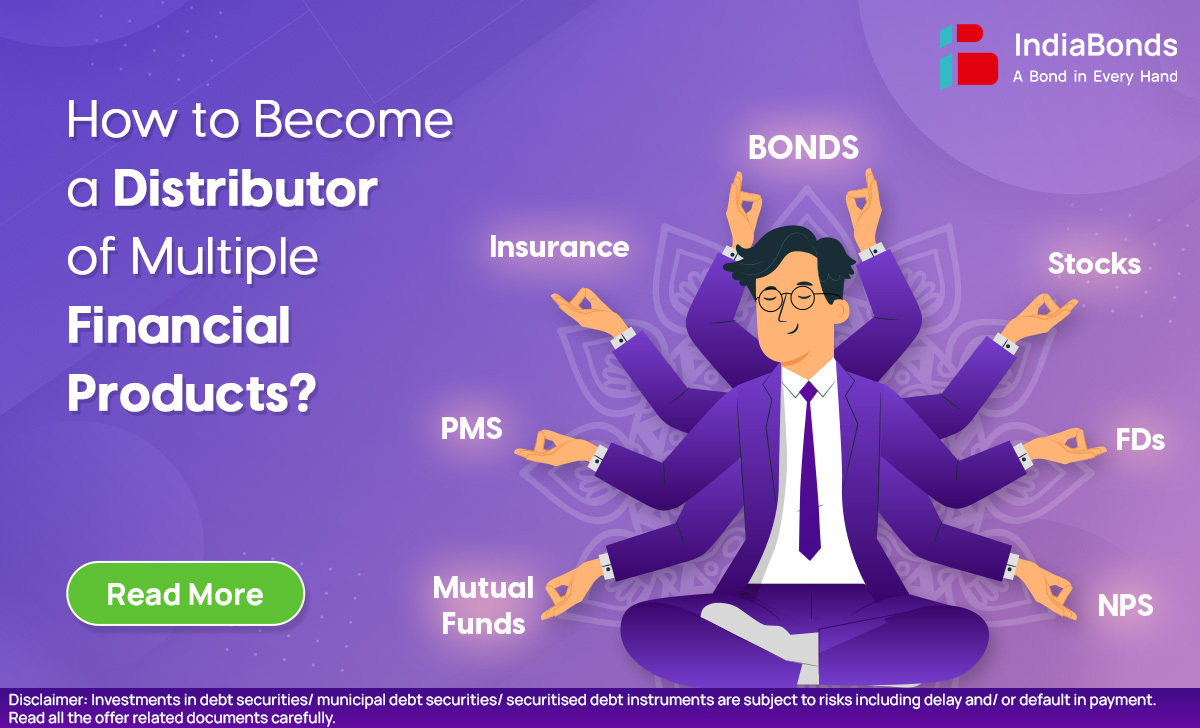
The Indian financial ecosystem has seen a significant transformation, particularly with the rise of fin-tech platforms and the increasing demand for diverse financial services. While influencers in the finance sector, or ‘fin-fluencers’, have popularized many investment strategies, their approach sometimes lacks the depth and reliability that professional distributors offer. Moving beyond the buzz, real opportunities exist for those who choose the path of distribution. This article aims to guide distributors on how to offer multiple financial products and creating a meaningful impact in the financial lives of their clients.
Financial literacy is essentially about the relationship you have with money. Many of the investors don’t have control over their finances, especially in this digital era where purchases are just a swipe away. It’s daunting for many to even look at their statements, which are often littered with orders from Amazon, Swiggy and the like. I personally know someone who took out a loan to travel to Europe, on top of having home and personal loans. That’s where an independent financial advisor or a distributor comes in. As an advisor, it’s crucial to educate clients about their finances and provide a holistic view. It’s their duty to prioritize their clients’ interests. A good distributor having knowledge of multiple financial products will guide their clients through their financial journey and help them navigate through the turbulent waves of uncertainty.
Distributors often face several pain points that can hinder their effectiveness and growth. These include maneuvering the vast array of products and staying updated with market trends and regulatory changes, which can be overwhelming. Additionally, building a trustworthy reputation in a market saturated with competitors and fin-fluencers requires substantial effort and strategic marketing. Distributors also encounter difficulties in managing client expectations and maintaining a steady client base amidst economic fluctuations and technological advancements. Understanding these pain points is crucial for anyone looking to thrive in this field.
As a financial product distributor, you have the option to specialize in a single product, like becoming a Mutual Fund Distributor for mutual funds, or to offer a variety of products, such as insurance, portfolio management services, fixed deposits and more. It really depends on your goals, but here’s why it’s advisable to become a distributor of multiple financial products:
Diversify your client’s portfolio: With access to a broader product range, you can enhance your client’s portfolio, which reduces the overall risks and enhances their returns. Providing comprehensive solutions helps keep clients by meeting more of their financial needs.
Multiple Revenue Streams: By distributing a variety of products, you can stabilize your income because you’re not relying on just one product.
Increased Market Reach: Offering multiple products opens doors to different customer segments and needs.
Competitive Advantage: A diverse portfolio sets you apart from competitors who have fewer options.
Flexibility in Market Fluctuations: Having multiple products helps buffer the impact of market volatility that might affect any single sector.
Improved Brand Image: Offering a range of reputable financial products boosts your business’s credibility and trustworthiness.
Adaptability to Regulatory Changes: A diverse portfolio of products can help mitigate risks associated with regulatory changes that affect specific financial sectors.
To become a successful distributor of multiple financial products, ideally all you need is a passion for finance, an insatiable thirst for knowledge and a genuine desire to positively impact people’s lives. However, the steps below provide a framework for anyone looking to venture into distributorship or elevate their financial advisory game:
1. Market Research
The process begins with comprehensive market research, which includes pinpointing the appropriate target market, understanding the investment behaviors of retail investors and analyzing both market demand and competition. This will help the distributor gain insights into consumer preferences, identify their challenges and determine if there’s any unexplored opportunity among competitors. By doing so, the distributor can select the right products to address the gaps identified earlier.
2. First learn, then earn
It’s pretty clear that having a robust knowledge of financial products is key to success for any financial advisor. Think of yourself as a financial doctor whose main goal is to address the financial (ailments) needs of your clients, like tax planning and investment advice. Besides market knowledge, soft skills such as relationship management, communication, and empathy are crucial for a distributor looking to run a successful business. Learning isn’t a one-time thing; advisors who continuously invest in their education and training always have the upper hand when it comes to business growth.
3. Legal and Regulatory Requirements
It’s crucial for distributors to have the necessary licenses and certifications to stay compliant with regulations. For Mutual Fund Distributors (MFD), having a NISM Series VA certification is mandatory. Similarly, if you’re selling Portfolio Management Services (PMS), you’ll need to clear the NISM Series XXI-A: PMS Distributors Certification Examination and for selling insurance, obtaining a license from the IRDA is essential.
4. Developing a Business Plan
Based on your market research, acquired knowledge and the necessary licenses, you’re now ready to start your business. This is the foundational step where you will define business objectives and goals, build your business infrastructure and engage in financial planning and budgeting. You’ll also develop growth strategies and focus on marketing and customer relationship management (CRM). It’s important to have a forward-looking plan and multiple backups. Setting up these systems will help keep you organized and prepare you to launch your business successfully.
5. Client Management and Networking
Maintaining relationships with partners and clients is likely the most crucial step in the framework. Effective client relationship management is vital; it builds trust and can be a great source of potential leads through referrals. Building your network and leveraging industry connections can give your business a significant boost. Remember, your network is your net worth!
6. Scale up
Take your business to the next level Scaling is certainly a crucial step, not the last, but an important one. You’ll need to develop strategies for the expansion and growth of your business. One challenge for distributors is the lack of technological awareness. We live in a tech-savvy world where most retail investors now make their decisions online. Going digital is essential when it comes to scaling your business. Reducing reliance on tedious paperwork and investing more in technological solutions will make you more efficient. Scaling also involves diversifying your product offerings, expanding your team and setting up franchises, in addition to embracing technology.




Bonds are an essential asset class that provides safety, predictability of returns and a vital means for portfolio diversification. As a distributor, incorporating bonds into your offerings can significantly benefit your clients, particularly in stabilizing their investment strategies during volatile market conditions. The fixed interest income (coupon payments) from bonds is a reliable source of cash flow that clients can use strategically. Distributors can guide their clients to channel these funds into other investment vehicles such as SIPs for equities or to cover insurance premiums, enhancing both growth potential and financial security. Offering bonds not only enriches your product mix but also positions you as a comprehensive advisor capable of catering to a broad spectrum of financial needs.
The IndiaBonds Partner Program offers an exceptional opportunity for financial products distributors to enhance their service portfolio and revenue. With over 125,000 registered users and more than INR 2,000 crore in transactions, IndiaBonds ensures a robust and efficient platform. Partners benefit from seamless digital integration for easy management, highly competitive bond prices and advanced tools. Additionally, the program includes comprehensive learning modules such as webinars and hand-holding sessions that support continuous professional development and ensure distributors are well-equipped to handle the market’s demands. The program caters to a diverse clientele with a wide range of products, thereby establishing a lucrative revenue stream for distributors.
It is well-suited for Mutual Fund Distributors, Chartered Accountants, Insurance Agents, Equity Brokers, PMS Distributors, Independent Financial Advisors, SEBI Registered Investment Advisors, etc. looking to scale their income and stay ahead with cutting-edge technology and comprehensive support. To know more about the partner program, click here.
In conclusion, embracing the role of a financial products distributor is not just about expanding your business; it’s about making a real difference in the financial lives of your clients. With the increasing complexities of the financial markets and the dynamic technological advancements shaping the industry, there’s a profound need for qualified financial advisors who are not just technologically adept but also deeply understanding of market shifts and regulatory environments. The IndiaBonds Partner Program supports this evolution by offering tailored, competitive and efficient services to the distributors. As the landscape of financial advisory evolves, the necessity for skilled advisors becomes more apparent—every family that has a doctor or a lawyer should also have a dedicated financial advisor. Embrace the challenge and become the trusted financial advisor who makes a lasting difference in people’s lives.
A. You typically need specific certifications depending on the products you wish to distribute. For example, a Mutual Fund Distributor requires an NISM VA certification, Portfolio Management Services need NISM-Series-XXI-A: Portfolio Management Services PMS Distributors Certification and selling insurance requires a license from the IRDA.
A. Distributing multiple products helps diversify your revenue streams, enhances your market reach, improves client retention, provides competitive advantages and helps buffer market fluctuations.
A. Yes, embracing technology is crucial. You’ll need systems for digital management, customer relationship management and possibly an online platform for offering your services and interacting with clients.
A. The IndiaBonds Partner Program is open to Mutual Fund Distributors (MFDs), Independent Financial Advisors (IFAs), insurance agents, equity brokers, Chartered Accountants (CAs), Portfolio Management Services (PMS) distributors, SEBI-Registered Investment Advisors and finance enthusiasts.
A. To become a successful distributor of financial products, focus on gaining the necessary certifications, understanding your market through thorough research, creating a robust business plan, leveraging technology for efficient operations and continuously updating your knowledge and skills in finance.
Disclaimer: Investments in debt securities/ municipal debt securities/ securitised debt instruments are subject to risks including delay and/ or default in payment. Read all the offer related documents carefully.